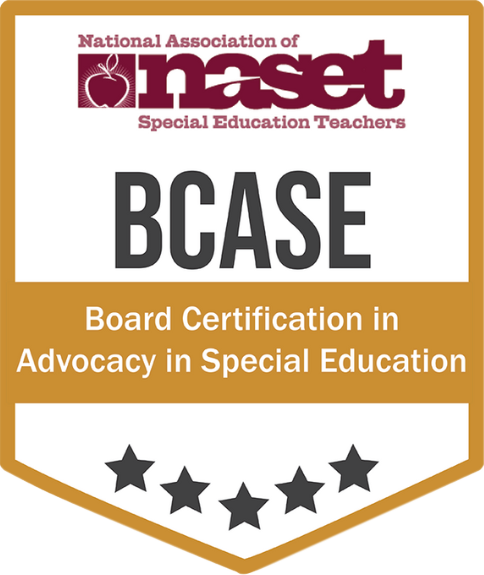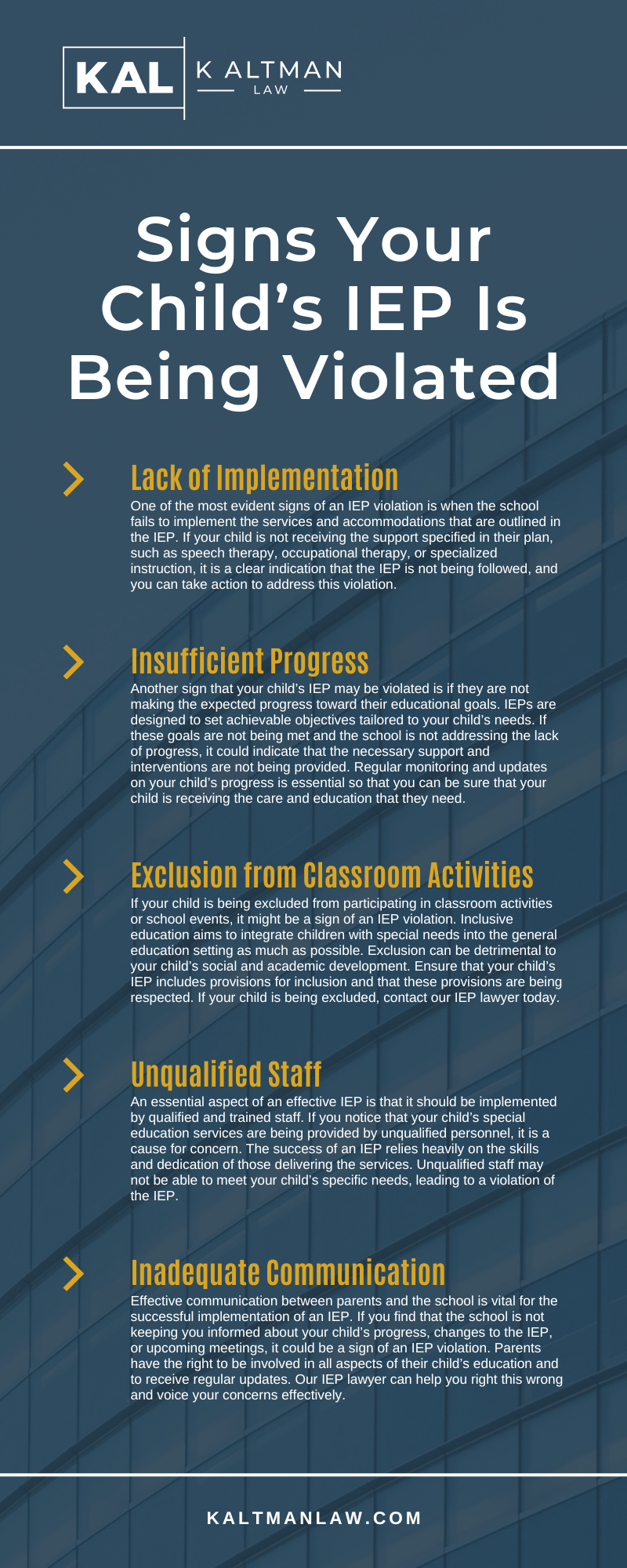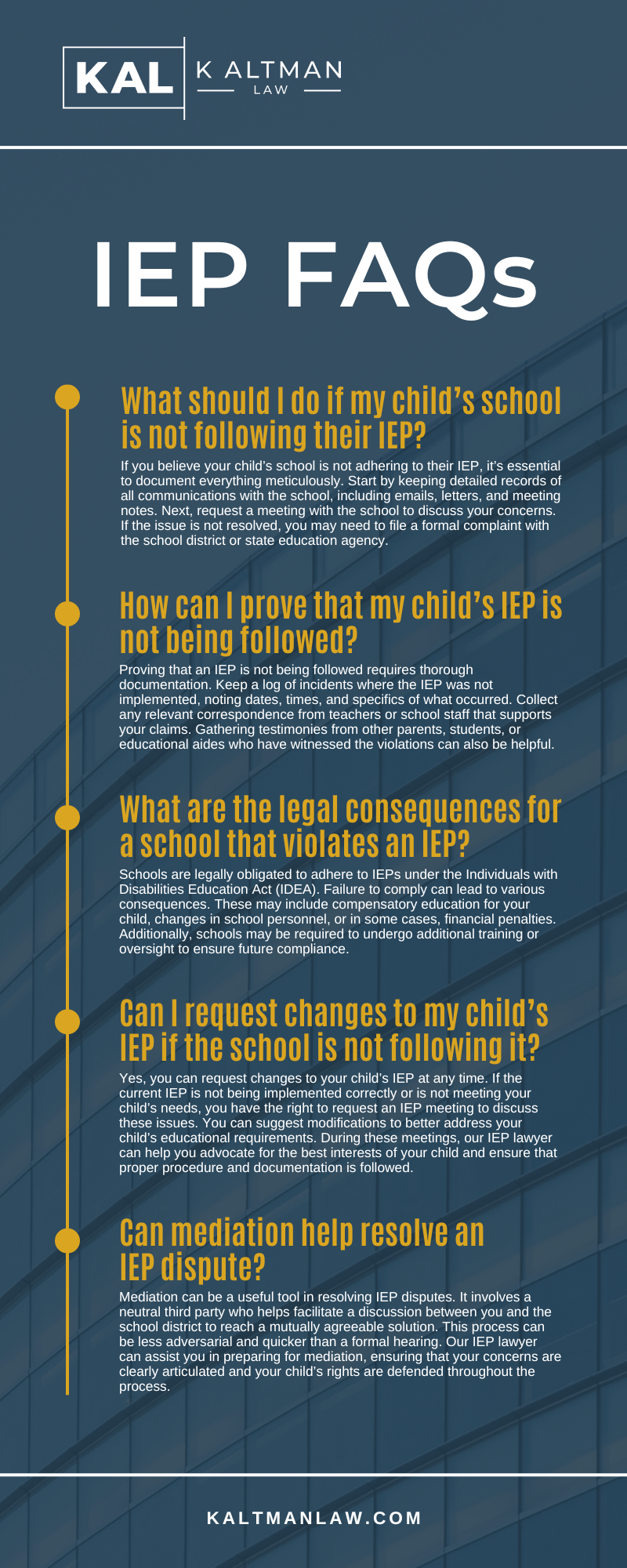Kids with special needs have to go through unique challenges at school and home. Our IEP lawyer knows that guardians and parents are tasked with making educational choices for their child’s needs, which can be stressful and complex. This is particularly true if you are not sure what services, programs, or legal protections you can use to advocate for your child’s wellbeing. If a child with special needs gets their needs denied, it is considered a form of discrimination. Staff, schools, and families can create an Individualized Education Plan (IEP) so that students have an appropriate education in the least restrictive environment possible. If you have questions or concerns about this, please contact K Altman Law today for more information.
Individualized Education Plan (IEP)
An individualized Education Plan (IEP) is a document that describes the education and services a student with special needs will have. The IEP is developed by a team of people, including the guardians or parents. It states how the student will receive their education in a school setting. This document outlines the kind of services the student will receive, such as the duration and frequency of each. For instance, a student may have speech therapy for half an hour once a week in a group environment with only a few other students. The IEP team creates specific and measurable goals so that the student’s needs are met and they are set up to succeed. Generally, an IEP details the student’s educational performance, eligibility, goals, accommodations, and other related services.
Process Of Qualifying For An IEP
Unfortunately, not every child who struggles in the classroom will automatically receive an IEP. There is a process to qualify for an IEP. The student has to meet two types of criteria. Firstly, they have to be eligible based on the Individuals With Disabilities Education Act. Secondly, this eligibility interferes with the student’s ability to access the class curriculum. Parents who believe their child could benefit from special education services are encouraged to speak with our dedicated IEP violation lawyer. Not only can we handle the process of qualifying for an IEP, but we can assert your child’s rights and protections if there is an IEP violation. Examples of IEP violations can be failure to implement, failure to provide appropriate accommodations, and failure to provide services in a timely manner, among others.
Student Special Needs Assistance
We know that parents and guardians want to see their children thrive. When kids have a disability that interferes with their learning, it can make matters more stressful. School can be difficult enough as it is, even without the need for accommodations. Our IEP lawyer knows that your child’s health and wellbeing is the priority. We want to see your child feel at their best and ensure they get the support they need to succeed. We can start by reserving you a consultation to learn more. If you would like to hear about how we can be of help, please contact K Altman Law today.
Signs Your Child’s IEP Is Being Violated
If you believe that an IEP violation has occurred, our attorneys can help you receive justice. Being able to recognize an IEP violation is the crucial first step in a successful IEP case. By understanding the common forms that an IEP violation takes, you can position yourself to be aware of any violations that might have occurred regarding your child’s IEP.
With our team of skilled attorneys, academics, and legal specialists on your side, you can rest assured that your case is in good hands. Our firm has the necessary tools to fight for you. We are a full service law firm that provides comprehensive legal representation to clients throughout the United States. For more information on how we can assist you, contact K Altman Law today.
Lack of Implementation
One of the most evident signs of an IEP violation is when the school fails to implement the services and accommodations that are outlined in the IEP. If your child is not receiving the support specified in their plan, such as speech therapy, occupational therapy, or specialized instruction, it is a clear indication that the IEP is not being followed, and you can take action to address this violation.
Insufficient Progress
Another sign that your child’s IEP may be violated is if they are not making the expected progress toward their educational goals. IEPs are designed to set achievable objectives tailored to your child’s needs. If these goals are not being met and the school is not addressing the lack of progress, it could indicate that the necessary support and interventions are not being provided. Regular monitoring and updates on your child’s progress is essential so that you can be sure that your child is receiving the care and education that they need.
Exclusion from Classroom Activities
If your child is being excluded from participating in classroom activities or school events, it might be a sign of an IEP violation. Inclusive education aims to integrate children with special needs into the general education setting as much as possible. Exclusion can be detrimental to your child’s social and academic development. Ensure that your child’s IEP includes provisions for inclusion and that these provisions are being respected. If your child is being excluded, contact our IEP lawyer today.
Unqualified Staff
An essential aspect of an effective IEP is that it should be implemented by qualified and trained staff. If you notice that your child’s special education services are being provided by unqualified personnel, it is a cause for concern. The success of an IEP relies heavily on the skills and dedication of those delivering the services. Unqualified staff may not be able to meet your child’s specific needs, leading to a violation of the IEP.
Inadequate Communication
Effective communication between parents and the school is vital for the successful implementation of an IEP. If you find that the school is not keeping you informed about your child’s progress, changes to the IEP, or upcoming meetings, it could be a sign of an IEP violation. Parents have the right to be involved in all aspects of their child’s education and to receive regular updates. Our IEP lawyer can help you right this wrong and voice your concerns effectively.
Filing A Formal Complaint Against A School For An IEP Violation
If you believe that your child’s educator has violated your Individualized Education Program, our IEP lawyer can help you. When parents entrust their child’s education to a school, they expect the institution to adhere to the agreed-upon IEP. Unfortunately, there are instances when schools fail to meet these obligations, leading to IEP violations. Understanding how to file a formal complaint against a school for such violations is crucial in ensuring that your child’s educational rights are protected.
We understand the personal nature of your case and will take the time to work hand in hand with you in order to meet all of your needs. Our service is driven by a personal commitment to fairness, integrity, and the principles of justice. To discuss your situation with our team, contact K Altman Law today to schedule a consultation.
Understanding IEP Violations
An IEP violation occurs when a school does not follow the stipulations outlined in a student’s IEP. This can manifest in various ways, such as not providing the agreed-upon services, failing to make necessary accommodations, or not adhering to specified timelines for evaluations and meetings. Any deviation from the IEP can significantly impact a child’s educational progress and well-being, and requires timely action to ensure that your child is receiving the care and services that they deserve.
Documenting The Violations
Once a potential IEP violation is identified, it is essential to document all related incidents meticulously. Keep detailed records of communications with school staff, notes from meetings, copies of the IEP, and any other relevant documentation. This evidence will be crucial when filing a formal complaint, as it substantiates your claims and helps build a strong case.
Filing The Formal Complaint
To file a formal complaint against a school for an IEP violation, you need to follow specific procedures set by your state’s Department of Education. Typically, this involves writing a detailed letter outlining the violations and providing supporting evidence. Ensure that the complaint is clear, concise, and includes all necessary documentation. It’s advisable to send this complaint to both the school district and the state education agency to ensure proper handling and oversight. Our IEP attorney can help you draft your complaint in order to ensure that all necessary information and complaints are included.
Seeking Legal Assistance
Navigating the formal complaint process can be complex and overwhelming. Our IEP lawyer can provide invaluable assistance in this regard. They can help in drafting the complaint, ensuring that all legal requirements are met, and representing you in any subsequent proceedings. An experienced lawyer will also be familiar with the nuances of special education law, which can significantly enhance the chances of a successful outcome.
The Aftermath Of A Complaint
After filing a formal complaint, an investigation will typically be conducted by the state education agency. If the investigation finds that an IEP violation has occurred, the school may be required to take corrective actions. This could include providing compensatory education services to the child, revising the IEP, or making systemic changes to prevent future violations.
Receive Dedicated Legal Assistance Today
If you believe your child’s IEP is not being properly implemented, don’t wait to take action. Our team is here to help your child receive the education, care, and assistance that they need. Contact K Altman Law today to discuss your case and explore your options.
IEP FAQs
If you have questions about a potential IEP case, our IEP lawyer is here to help you. We understand the importance of ensuring that your child receives the educational support they are entitled to. When a school fails to follow an Individualized Education Program (IEP), it can significantly impact your child’s education and development, and you have the right to take action. For further information on how we can assist you with an IEP case, contact K Altman Law today.
What should I do if my child’s school is not following their IEP?
If you believe your child’s school is not adhering to their IEP, it’s essential to document everything meticulously. Start by keeping detailed records of all communications with the school, including emails, letters, and meeting notes. Next, request a meeting with the school to discuss your concerns. If the issue is not resolved, you may need to file a formal complaint with the school district or state education agency. Our IEP lawyer can help you through every step necessary in order to protect your child’s rights and interests.
How can I prove that my child’s IEP is not being followed?
Proving that an IEP is not being followed requires thorough documentation. Keep a log of incidents where the IEP was not implemented, noting dates, times, and specifics of what occurred. Collect any relevant correspondence from teachers or school staff that supports your claims. Gathering testimonies from other parents, students, or educational aides who have witnessed the violations can also be helpful.
What are the legal consequences for a school that violates an IEP?
Schools are legally obligated to adhere to IEPs under the Individuals with Disabilities Education Act (IDEA). Failure to comply can lead to various consequences. These may include compensatory education for your child, changes in school personnel, or in some cases, financial penalties. Additionally, schools may be required to undergo additional training or oversight to ensure future compliance. We will help you pursue an outcome that represents the best possible situation for you and your child and sufficiently holds the school responsible for violations.
Can I request changes to my child’s IEP if the school is not following it?
Yes, you can request changes to your child’s IEP at any time. If the current IEP is not being implemented correctly or is not meeting your child’s needs, you have the right to request an IEP meeting to discuss these issues. You can suggest modifications to better address your child’s educational requirements. During these meetings, our IEP lawyer can help you advocate for the best interests of your child and ensure that proper procedure and documentation is followed.
Can mediation help resolve an IEP dispute?
Mediation can be a useful tool in resolving IEP disputes. It involves a neutral third party who helps facilitate a discussion between you and the school district to reach a mutually agreeable solution. This process can be less adversarial and quicker than a formal hearing. Our IEP lawyer can assist you in preparing for mediation, ensuring that your concerns are clearly articulated and your child’s rights are defended throughout the process.
Contact Our IEP Lawyer Today
Ensuring that your child’s educational needs are met is of utmost importance. If you suspect that your child’s school is not following their IEP, taking immediate and informed action is crucial. Our team is here to help you protect your child’s rights. Contact K Altman Law today to schedule your consultation.





